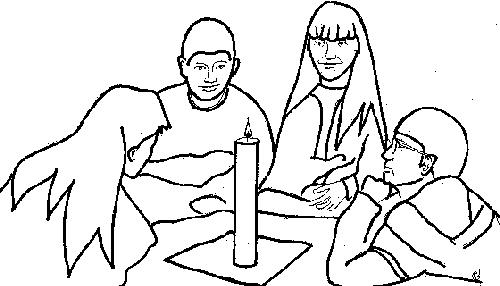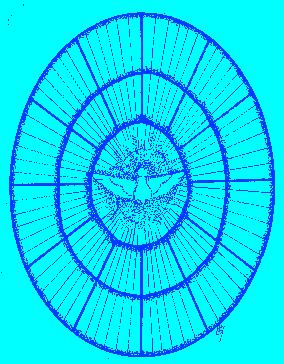
|
|

Stewardship
Talents and the Holy Spirit
| T |
he Gospels speak often of talents and their use. Jesus says "One who
lights a lamp does not put it in the cellar or under a bushel basket, but rather
on a lampstand, so that they who come in may see the light" (Lk 11: 33). In
the Parable of the Talents (Mt 25: 14-30) we are told that the person producing
most receives the greatest reward, and the person who does not their talents is
condemned. In the parable, Jesus is speaking of a coin called a "talent,"
however in our application we use the same word to mean the "gifts" we
are blessed with. How does the Holy Spirit inspire and guide us to use our "talents"
for the sake of the Kingdom of God?
We often think of
talents as the ability to sing, dance, play piano, write or teach. Is this what
the Gospel had in mind when it spoke of talent? No. In light of the Gospel these
abilities to teach or sing or dance; important as these accomplishments are, are
only secondary.
Our real talent is to remain in God. It
alone is the core, and anything else is subordinate. Jesus tells us: "Live
on in Me, as I do in you. No more than a branch can bear fruit of itself apart
from the vine, can you bear fruit apart from Me. I am the vine, you are the
branches. He who lives in Me and I in him will produce abundantly, apart from Me
you can do nothing. ... My Father has been glorified in your bearing much fruit
and becoming My disciples" (Jn 15: 4-5,8).
Our basic
talent then is to remain in God. That is the light that may not be hidden, but
must shine forth. The power of the Holy Spirit in Jesus Christ and in each
baptized person makes all we are and all we do valuable ~ a worthy talent. "God
Is with Us!" is the constant proclamation of the Church. Our daily lives
testify to the truth that: "This is the work of God: have faith in the One
whom He sent" (Jn 6: 29).
God has been poured out
into our hearts through the Holy Spirit Who has been given to us (Rm 5:5) and
Who dwells within us (Rm 8:9), so that we may see what love the Father has
bestowed upon us in letting us be called children of God (1 Jn 3:1)! Jesus is "the
way, the truth and the life" who leads us into the most intimate presence
of the Holy Trinity. We pray: "Come and abide within us, Father, Son and
Spirit."
We praise God most when we use all our
talents: our personal giftedness, our time, our treasure, our energy, and our
awareness to live consciously in Christ in order that with His mind we may
glorify the Father in His Spirit of love.
We enter into a
mutual sharing with God. God lives within us and raises us up by His free gift
of Himself in His grace, divinizing us into participators of His very own nature
(2Pt 1:4). Our awareness of God's presence within us makes all our thoughts and
actions capable of building up the Kingdom of God and we become good stewards
who will hear "Come, share your Master's joy" (Mt 25: 23)!
Staying Close

The shepherd explained that the sheep was born partially deaf and could not hear the shepherd's voice. As a result, it was always walking into danger. A few times it even had to be rescued from the brink of death. Finally, the shepherd had to inflict an injury upon the leg of the sheep. Since then, the sheep limped, but it also stayed closer to the shepherd for guidance and protection. This story reminds us of a similar "limp" spoken about by St. Paul. He called it his "thorn in the flesh" (2Cor 12:7). It may have been some chronic illness that caused him great discomfort, some weakness toward anger or a personality disorder. The "limp" that afflicted St. Paul did not come from God. St. Paul declares this as "an angel of Satan to beat me." But God did not remove it despite his prayers. God's love allowed it to remain in order to keep St. Paul "limping" at the Shepherd's side where he would find constant strength for his weakness. Each of us also has something that causes us to "limp"; a weakness, a tendency to a particular sin, or a certain failure. Does our "limp" cause us to depend on Christ, the Good Shepherd? | |
| Sharing The Spirit | |
In one parish a parishioner who had not participated in the Divine Liturgy for several weeks, was approached by a fellow parishioner and asked: "You know, I have missed seeing you in church." The delinquent parishioner was flattered to know there was someone who missed him when he did not attend the Liturgy on Sunday. Since then he has been attending the Liturgy faithfully with his family. All it took was a show of kind, personal concern on the part of a friend. The greatest gift that any person can give to another is Christ. Very few people pass even a single day without being in touch with someone who does not know Christ, but who greatly needs to know Him. We sometimes hesitate to speak to others about Christ. But let us remember that when we speak to others about Christ and the Church we are not asking them to follow us. We are asking them to follow Christ. We are like real beggars ~ one telling another where to find bread. Jesus told us: "You are the Light of the world." |
| Grandma's Lap | |||
|
Time  |
Keep careful watch over your conduct. Do not act like fools, but like thoughtful men. Make the most of the present opportunity, for these are evil days" (Eph 5:15-16).
"I have only just a
minute,
Only 60 seconds in it,
Forced upon me ~ can't refuse it,
Didn't
seek it, didn't choose it, But it's up to me to use it ~
Give account if I
abuse it: just a tiny little minute ~
But eternity is in it.
Time is too precious a gift,
too scarce a commodity to be squandered. If we waste it, we lose more
opportunities than we know. Each moment is an opportunity for prayer, for
kindness, for self-control, for personal growth. "Make the most of every
opportunity" (Col 4:5).
If time is charged with
opportunity and not merely a succession of empty moments, it is shameful to
waste it and sinful to kill it. The Sacred Scriptures remind us often that time
is a God-given opportunity for us to use, to repent, to turn towards Christ
seeking salvation, to love God and neighbor, to grow more and more into His
likeness.
How we spend time is far more important than
how we spend money. Money mistakes can be corrected; but when time is gone, it
is gone forever.
| Our Contact to Glory |
 In the majestic Basilica of St. Peter in Rome stands the Cathedra or Chair,
executed by Bernini in the seventeenth century. The bronze Chair is supported by
four statues of doctors of the Church: St. Athanasius and St. John Chrysostom
from the Eastern Church and St. Ambrose and St. Augustine from the Western
Church. Above, a radiant sunburst in gilded stucco adorned with angels and
clouds encircles a dove, the symbol of the Holy Spirit, who is the soul of the
Church. It appears to be so small, but in this enormous space, even the 35-foot
wing span of the Dove is dwarfed. We find a profound idea expressed here: the
Chair is the symbol of the teaching authority of the Church; the Holy Spirit
inspires and guarantees this teaching according to the promise of Christ; while
theological reflection, symbolized by the holy doctors, depends on it, and at
the same time makes it more widely known and more profoundly understood.
In the majestic Basilica of St. Peter in Rome stands the Cathedra or Chair,
executed by Bernini in the seventeenth century. The bronze Chair is supported by
four statues of doctors of the Church: St. Athanasius and St. John Chrysostom
from the Eastern Church and St. Ambrose and St. Augustine from the Western
Church. Above, a radiant sunburst in gilded stucco adorned with angels and
clouds encircles a dove, the symbol of the Holy Spirit, who is the soul of the
Church. It appears to be so small, but in this enormous space, even the 35-foot
wing span of the Dove is dwarfed. We find a profound idea expressed here: the
Chair is the symbol of the teaching authority of the Church; the Holy Spirit
inspires and guarantees this teaching according to the promise of Christ; while
theological reflection, symbolized by the holy doctors, depends on it, and at
the same time makes it more widely known and more profoundly understood.It is in the same sign of the dove that the Holy Spirit once hovered over the baptism of Christ in the Jordan River when the heavenly Father proclaimed to the world: "This is my beloved Son..." Thus were revealed for the first time the three Persons of the Blessed Trinity to the world. All works of God are common to the three divine Persons. But it is the Holy Spirit who is directly involved with us since Pentecost. The image in the window proclaims to all that the gift of the Holy Spirit is the heart of the Church and is ever present in it, i.e., not in the edifice, but primarily in its baptized members. We comprise the living Church, since the Holy Spirit has been sent by our Lord into the world as Christ had promised to complete God's plan for our salvation. The Holy Spirit is the agent to bring about its fulfillment. Ever since Pentecost, when He descended upon the assembled apostles in the Upper Room in Jerusalem, He is ever-present in each and every one of the faithful. For us the Church is the Upper Room where we are filled with the Holy Spirit each time we receive the Holy Eucharist. St. Paul in his Epistles proclaims that through Baptism in Christ, the Holy Spirit takes up his abode in the believer and thereby restores the likeness of God by purifying the person of the sin of our first parents, and if the candidate is an adult, all sins. He infuses in all a new life which is called grace, or better yet, divine life, which God lovingly wills to share with His creatures through the Holy Spirit. We truly can't find words to express this awesome mystery of our becoming a new person. By God lovingly sharing His divine life with us, we faithful become children of God and call God, Abba, our Father. We are thereby his adopted children and belong to His family or the kingdom of God that we call the Church. He thus makes us His heirs to His kingdom. |
| Go to Seminary's Home Page |
These
pages were designed by: MarMaPhASMaNaJ (© 1997 by Stamford Eparchy) |
Go to Eparchy of Stamford |